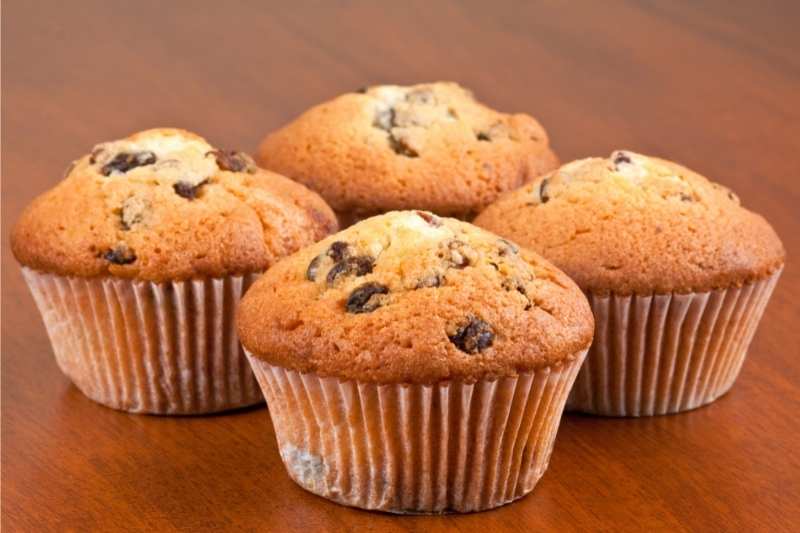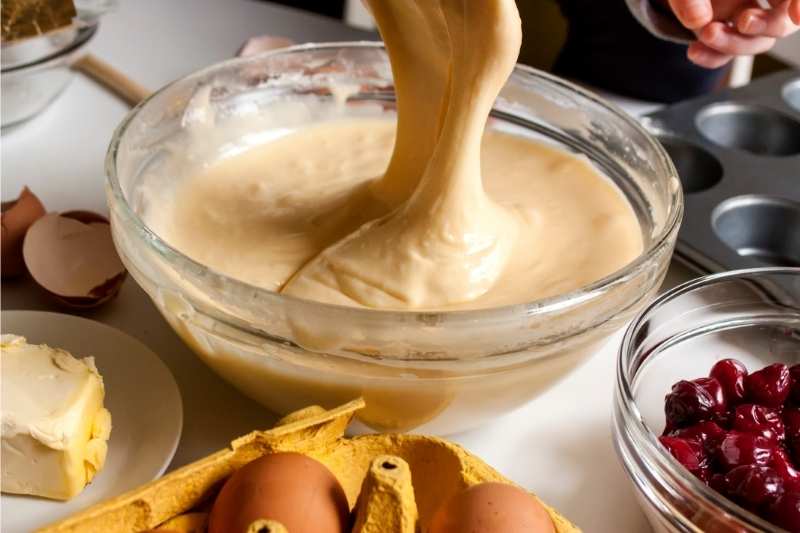This post contains affiliate links.
Muffins make a great snack or quick breakfast for busy mornings when you have so much to do. If you enjoy baking muffins as I do, you may have noticed times when your batch came out dry, cracked, and hard. If you’ve run into this problem, you’ve come to the right place!
As a general rule, muffins usually come out dry and crumbly because they have been overbaked or overmixed. Overbaked muffins become dry since most of the moisture in the muffins will evaporate overtime in the oven. Overmixing the muffins can create dense batter which will become hard when baked.
Learning about all the reasons why my muffins turned out dry helped me prevent it from ever happening again. Keep reading to see the full breakdown of why you may run into this problem, and how to fix as well as prevent it so you’ll never have to worry about ruining your muffins again!
Why Are My Muffins Dry?
Muffins become dry for two main reasons, the muffins have either been left in the oven to bake for too long, or the batter was roughly over-mixed. Overbaked muffins will become dry since the moisture is mostly evaporated while overmixing will create a dense batter that will get dry in the oven.
Usually, when I end up with dry muffins it’s because I’ve left them in the oven for a little longer than I should have. Overbaking will pull all the moisture out of your batter, leaving you with dry, hard muffins.

During my search for the perfect muffin/cupcake, I came across a Great Nonstick 12-Cup Muffin Pan that will make my muffins/cupcakes the perfect size. Ever since I got it, my muffins came out looking better than ever before! You can find this Muffin Tin on Amazon!
When you mix your batter, you need to be mindful of how you add your ingredients. Usually, what you want to do is combine all of your dry ingredients in a bowl first. Create a small dip in the middle and then add your wet ingredients.
After you’ve combined your ingredients, slowly start mixing them with a spatula. Only mix until the ingredients have completely combined. This process should only take fifteen to twenty strokes at the most!
*Side Note: You might also want to know Why Your Muffins Didn’t Rise the way they were supposed to. I recently wrote an article talking about Tips For Preventing Flat Muffins, you can check it out here!
By avoiding these two common mistakes you’re more likely to end up with a perfect batch of muffins!
Common Causes Of Dry Muffins
Common causes of dry muffins are overbaking or overmixing the batter. They can also become dry when they are left in the pan for too long after baking, or if they were baked at too high of a temperature.
While overmixing and overbaking are two main reasons you end up with dry muffins, there are some other common reasons why they turned out this way. Fortunately, these reasons can be remedied quite easily so this never happens to you again!
- You left the muffins in a hot pan for too long
- You baked at a temperature that is too high
I’ve made the mistake of leaving my muffins in the pan to cool for too long. This causes the muffin liners to stick to the pan because the muffins dried up.
The muffins will get dry if left in the muffin tin because the muffin tin usually retains the heat longer than the muffins themselves. So leaving the muffins in the tin will continue to bake them making them hard and dry.
A good rule of thumb is to leave the muffins in the baking tray for no longer than five minutes or so. This is the perfect amount of time, as it allows them to cool just enough to be handled, but not so long that they start to stick and get hard.
Another reason I’ve ended up with dry muffins is not adjusting the temperature on my oven to what the recipe calls for. While all recipes may be slightly different, most call for the temperature to be set between 375 and 425 degrees Fahrenheit.
Be sure to keep an eye on your muffins as they bake, and remove them as soon as your timer goes off!
*Side Note: You might also want to know why your Muffins Are Crumbly as well as Dry. I recently wrote an article that talks about Fixing and Preventing Crumbly Muffins, which you can check out here!
Uncommon Causes Of Dry Muffins
Uncommon causes of dry muffins include:
- Using the wrong ingredients
- Using the wrong measurements
- Forgetting ingredients in the recipe
- Baking muffins at a higher altitude
I find it’s always a good idea to double-check your recipe every time you bake, even if you’ve made the dish dozens of times before. There have been times when I failed to double-check my recipe only to find out I left out an important ingredient after it was too late.
Even if you’re confident in your cooking skills and memory, always check your recipe!
On a similar note, be sure to double-check your measurements, and never pack your flour in your measuring cup! Flour should be measured out carefully, as it expands when it cooks. Packing your flour will lead to overfilled muffin tins and hardened results.
Baking at a higher altitude can also alter your results and leave you with dry muffins. When you bake at a higher altitude the liquids will evaporate more quickly, which means you may need to adjust the temperature of your oven as well as the baking time.
*By the way, I recently wrote an article about How to Aerate & Measure Flour The Right Way. This article talks about all the things you need to know to make sure you properly use flour when baking. You can check out this article here!
How To Fix Dry Muffins?
As a general rule, dry muffins can be fixed by infusing them with syrup or liquid in order to provide moisture and soften it on the inside. A wet glaze can also be created and brushed along the tops of the muffins. Make sure not to add too much moisture as it can make your muffins soggy.
Don’t throw your batch of dry muffins away just yet! As frustrating as it can be to end up with dry muffins, there are easy solutions to fix this problem!

You can either create an infusion liquid or a glaze to soften them up, or you can steam them to add moisture back inside of them.
Creating an infusion is quick and simple! To create this liquid you’ll need some milk and a bit of sugar. Combine your ingredients and brush along the top of your muffins until they are moist.
Another way you can salvage your muffins is by steaming them. Steaming your muffins adds moisture back inside without adding extra calories as an infusion or glaze can. If you’ve got a steamer on hand simply pop them inside for about three to five minutes.
I thought of the best way of doing this and I recently came across a Great Stackable Food Steamer that will work great for this problem! Just remember to play around with the amount of steam you need in order to prevent soggy muffins. You can check out this Steamer on Amazon!
How To Prevent Dry Muffins?
You can prevent the muffins from becoming dry by not overmixing the muffin batter. Overmixing the batter will create a dense mixture that will turn hard once baked. Also, avoid keeping the muffins in the pan for longer than 5 minutes after they’re baked so that they don’t continue to bake.
There are plenty of steps you can take to make sure you end up with a perfect batch of muffins. First, be sure to mix your ingredients just to the point where they are all thoroughly combined and not a minute longer.
Since overmixing is the top reason why muffins end up dry, you want to make sure you start your baking process with a perfectly mixed batter!
Another way to safeguard against dry muffins is by keeping a close eye on them as they bake! It takes just a few minutes for muffins to go from perfectly moist to hard and dry. Check on your muffins every couple of minutes, and pull them out just as they have finished baking.
*By the way, I recently wrote an article about How to Store Muffins to Keep Them Fresh for Longer. This article talks about the proper ways to store muffins at room temperature, in the fridge, and in the freezer to keep them fresh. You can check out this article here!
How Do You Keep Muffins Moist When Baking?
In order to keep muffins moist while they bake be sure to not let them stay in the oven for longer than necessary. Overbaked muffins will come out dry since the moisture in them evaporated. Make sure to avoid setting the temperature higher than the recipe calls for.
The simplest way to keep your muffins moist is by making sure you have added enough moisture to your ingredients prior to popping them in the oven.

Since liquid evaporates quickly in the oven be sure you’ve used enough milk, butter, and oil in your batter!
It can be tempting to try to raise the temperature slightly higher than necessary to cook your batch of muffins more quickly, but don’t do it! Muffins are somewhat more finicky when it comes to baking, so this is a time when you want to follow your recipe as closely as possible.
Why Are My Muffins Dense And Dry?
As a general rule, muffins are dense and dry because there’s not enough baking powder used in the batter. Not enough baking powder in the batter will prevent the muffins from rising and becoming fluffy. This will keep the muffins tightly compacted and dense when baked.
Whenever I’ve ended up with dense muffins in the past it was usually due to incorrectly measuring out my ingredients. The culprit is usually the amount of baking powder I used.
While the baking powder is an important ingredient to use in order to help your muffins rise and fluff up, not enough baking powder will throw the entire process off. You should always make sure to use the exact amount of baking powder, and be careful not to pack it either!
You’ll know if you’ve used too much baking powder if your muffins start to rise and then suddenly collapse into themselves.
This will lead to a ruined batch of dense, tough muffins!
Too little moisture will result in dry, crumbly muffins, so be sure you’re using enough liquid ingredients when you’re preparing your batter! Pay attention to all of those little details while you’re gathering and measuring your ingredients and you’ll increase your chances of a successful batch of muffins!
*By the way, you might also want to know If Cornstarch Can Replace Baking Powder. I recently wrote an article about Baking Powder Substitutes That Work, you can check it out here!
What Makes Muffins Light And Fluffy?
Muffins become light and fluffy due to the amount of milk, eggs, butter, and baking powder that the recipe calls for. Adding the right amount of baking powder will cause the muffins to rise and fluff during the baking process while staying moist.
If you’re wondering what the best way is to make sure your muffins end up fluffy, pay close attention to the amount of milk, eggs, and butter you’re using. Make sure you have enough moisture in your batter but don’t use too much or you’ll end up with a soggy mess on your hands or undercooked muffins!
By following the recipe as closely as possible and monitoring your muffins as they bake, you’ll be sure to end up with a successful batch of muffins every time!
*Side Note: You might also want to know How To Stop Cupcake & Muffin Liners From Folding In and Sticking. I recently wrote an article that explains How To Keep The Liners Looking Good When Baking In Them, which you can check out here!
To Summarize…
Hard and dry muffins were a nightmare of mine for a long time. Learning how to prevent these dry muffins allowed me to finally start experimenting with different muffin recipes! Just make sure to follow your recipe precisely and use just enough of the right ingredients to keep your muffins fluffy and moist!
